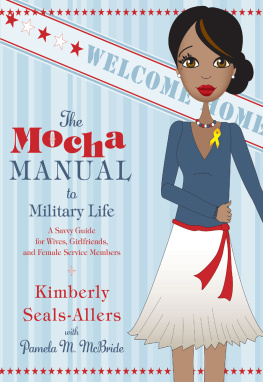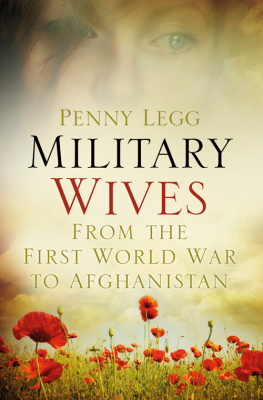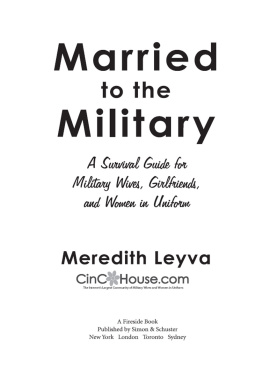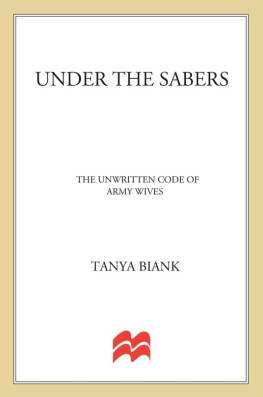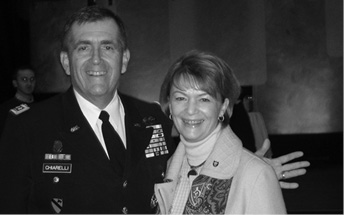12 Army Wives Give the Best Advice They Never Got
Sheridan Scott
Donna Lyons
B.K. Sherer
Other Books in the Series:
Now You Tell Me! 12 Actors Give the Best Advice They Never Got
Now You Tell Me! 12 College Students Give the Best Advice They Never Got
Now You Tell Me! 12 Army Wives Give the Best Advice They Never Got
Copyright 2012 Sharon Scott
Cover Design Christian Fuenfhausen
Book Design Mie Kurahara
eBook Conversion by Alliteration Ink
All rights reserved. No Part of this publication may be reproduced, stored in a retrieval system, or transmitted in any form or by any means, electronic, mechanical, photocopy, recording, or otherwise, without written permission of the publisher.
Now You Tell Me! is a trademark of Sharon Scott.
Arundel Publishing
36 Crystal Farm Rd.
Warwick, NY 10990
www.arundelpublishing.com
www.nowyoutellmebooks.com
Print ISBN 978-1-933608-31-0
ePub ISBN 978-1-933608-32-7
Kindle ISBN 978-1-933608-33-4
First Edition December 2012
Table of Contents
Appendices
Prologue
BETH CHIARELLI
Dont over-identify with what your husband is doing. Let him do his thing and you do yours.
The Army was Beth Chiarellis life for over forty years as her husband Peter progressed from second lieutenant to four-star general. Beth and Peter met in 1968 during their freshman year at Seattle University in Washington State. Beth was not from a military family and didnt know Pete was in ROTC when they started dating. She majored in community services and went on to use those skills on behalf of the Army community as her husband held each level of command from platoon to corps. Peter recently retired, having concluded his career serving four years as the second-highest-ranking general in the Army. Beth and Peter have three children, Peter, Erin and Patrick.
IN THE BEGINNING
I was totally clueless about the Army when I met Pete. He seemed like a normal person; I didnt even see him in uniform for quite a while. Of course, this was back in the 1960s when feelings ran high about Vietnam; Army Reserve units used to get bomb threats and the ROTC students didnt dare wear their uniforms on campus. It was very different from today.
Pete and I never had a conversation in which he said, Im going to be in the Army as a career. This is what I want to do. If I had understood more about the Army, the fact that he was so committed to ROTC would have been a clue. At the time, I didnt have any idea.
We got engaged at the beginning of our senior year and married after graduation. Pete was commissioned, and we headed to Fort Knox for his officer basic training. At the time, a student commissioned by the ROTC could probably satisfy his obligation to the Army in three years because Vietnam was dying down and they were letting people go. But we liked it and decided to stay.
MAKING A LIVING
IF YOU WANT SOMETHING, ASK FOR IT
Our first assignment after the Basic Course was Fort Lewis, which probably contributed to our decision to stay in. It was close to home, and we were there for five years. How we got there is a lesson in how the Army can work for you, if you ask the right questions. A major came to the Basic Course and talked to the students about their assignments. He said, If you have any questions about your assignment, give me a call. His name was Major Shaw, and Id love to meet him again sometime. Pete got orders for Fort Bliss, and we were both so nave about assignments we said, It would be so much better if we could go to Fort Lewis because its so close to home.
I said, That major said to call him if you had any questions.
Sure enough, Pete called him on Wednesday and said, Wed like to go to Fort Lewis. That Friday Major Shaw called back and said a position just opened at Fort Lewisso we got new orders!
Later in Petes career we would learn that it isnt always that easy to change assignments. But we did learn an important lesson at that point: if you want something, ask for it. The worst that can happen is they say No.
EARLY LESSONS IN ARMY POLITICS
We arrived at Fort Lewis and Pete was assigned to 3 rd of the 5 th Cavalry Battalion. He was a brand new second lieutenant working with aviators who were older and had served in Vietnam. We were newly married, and they accepted us as the little brother and sister of the group.
After Pete was promoted to first lieutenant, a captain was relieved of his company command (thats what the Army calls getting fired) because one of his tanks kind of leveled an apple orchard in Yakima, Washington. Pete was selected to take over, even though he was not yet a captain. This was my first experience with professional jealousy. His selection jumped him over some other officers who were hoping to be company commanders. This would have been a career-building thing for these guys just back from Vietnam. Now they were passed over for this young guy, and there were some hurt feelings that spilled into our social life.
At the time, I didnt have a clue what any of that was about. All I knew was suddenly I was invited to go to everything. I was on the list to go to the Colonels house and to this event and that one. But a couple of the spouses from the battalion were treating me differently, as if we were no longer friends, and I couldnt figure out why. When I said something to Pete, he explained that some of these guys had been to Vietnam two or three times and didnt get to command troops. That helped me understand why they might be upset, and while I couldnt change the career situation, I could do my best not to cause any further ill feelings. So I treated them like nothing had changed in our relationship, and was careful not to mention attending gatherings at the Colonels house.
HANDLING DEPLOYMENT AS A SENIOR SPOUSE
My husband deployed twice to Iraq. The first time was in 2004, when he was the Division Commander for 1 st Cavalry Division. The second time was in 2006, when he served as the Commander for Multi-National Corps-Iraq.
The first deployment was particularly hard. This was after the first big wave of combat operations in Iraq. All of the talk was that they were going over to replace the sewer system, restore electricity and provide potable waterto rebuild Baghdad.
They had barely gotten there, hadnt even officially taken over, when we lost eight soldiers. It was chaos. Nobody is ever ready for that. Nobody.
Before you know it, back home, we had to plan memorials for seventeen people. We started having these huge memorials every month. It became surreal. Now, sadly, its very ordinary, but then it wasnt. It seemed bizarre that we would have to have them.
I felt horrible for the chaplains back here at Fort Hood because every month for these mass memorial ceremonies they had to try to come up with something cogent to say that was new, or at least had a different twist, for wave after wave of newly bereaved families. It was very sad.
Some of the brigade commanders wives also had a very difficult time. They could go to each memorial ceremony, but they could not handle going back and talking to family members afterward. I supported their decisions. I always said, if that is not your thing, if its not something with which youre comfortable, do not go back to visit the families. Dont force it if you cant handle it. It doesnt help anyone.
I felt the same way when they started creating Care Teams to visit the families of deceased soldiers. This is not for everybody. It is absolutely not for everybody. This is stuff that will affect you for the rest of your life, so dont think this is something that you have to do if you cant handle it, emotionally or spiritually or mentally.




